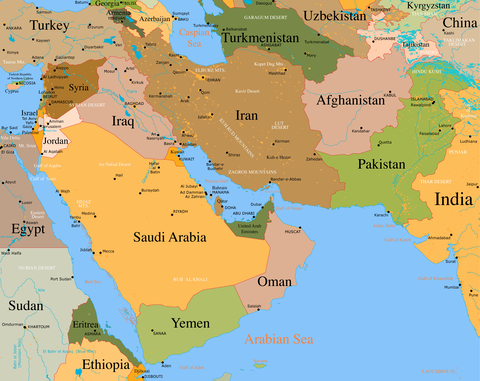
Even as a horrific war of attrition rages in Europe, the Middle East is again demanding its pound of flesh. It is poised to drag President Joe Biden back into the morass of abiding enmity between Israel and Iran and deep distrust between Saudi Arabia and Iran.
With inflation above 9% in the US and Western European economies teetering on the edge of recession, many are criticizing Biden for embarking on an embarrassing mission to Saudi Arabia. The 79-year-old is said to be going cap in hand to persuade the brash 36-year-old Crown Prince Mohammed bin Salman to increase oil exports substantially enough to bring gasoline prices down in the US for a while.
But this may be a hasty reading of Biden’s important visits to Israel and Saudi Arabia. For Asian friends like Indonesia, India and Malaysia, the keys lie in the Middle East to peace going beyond a state of “no war” with Russia, China, Iran, and Muslim terrorists in Africa and Asia.
An oil-rich Mideast in a state of permanent cold war — while Syria, Iraq, Yemen and Libya lie in near ruins — would continue to be a theatre of proxy wars between US-led allies and Russia and Iran.
Iran’s destabilizing impacts in the region, as in Syria, Lebanon and Yemen, will continue to raise Israeli hackles and could pull the US into a new conflict at any moment. Earlier this week, Biden signed another agreement with Israeli promising support and even war “as a last resort” if Iran tries to acquire nuclear weapons.
There was a time when persuading the Saudis to open their oil taps could bring energy prices down, including those of refined products like gasoline, for the near and medium terms. But that period waned with the COVID-19 pandemic and the US-European determination to stifle Russia’s oil exports and, if possible, its natural gas exports.
Oil-based energy is an indispensable input for almost all economic activity, including fertilizers for agriculture, electricity for households and factories, and basics like cement, steel and aluminum for industrial production.
Russia’s attempts to use oil exports as a weapon to punish its European adversaries have exacerbated the energy supply-demand gap in the US and Europe. It will remain a leading cause of near term inflation until the US-led allies work out how to manage without Russian oil and gas.
The Saudis are making almost $1 billion a day from the value of their crude oils exports, which increased by 123% year on year thanks mainly to the war in Ukraine, according to official Saudi statistics. There is very little incentive for the Saudi prince to give up this windfall and acquiesce to Biden’s request for help to puncture the energy component of US inflation.
Even if he tries to help, the problems for American consumers facing higher prices for almost everything are unlikely to go away in time for the November congressional elections.
Whatever Biden achieves on oil, Asian powers are hoping that his visit will sow the seeds of a new security architecture for the Middle East, which could improve prospects of peace in other regions as well.
The current firestorm is deeply destabilizing politically of Russia’s war in Ukraine, economic disruptions of the pandemic, impacts of climate change and the specter of nuclear weapons use by Russia.
Biden could treat this moment as defiance of the US-established world order that should be met with more lethal military deterrence and penalties. Or he could listen carefully to countries not involved in the Ukraine war, unlike his European allies, and consider how to reform the international security system to make everyone feel safer.
To his credit, Biden has already taken a first step towards dialogue for a reformed security architecture. He called a first virtual Summit meeting on Thursday of a new quadrilateral forum for cooperation called I2U2 comprising Israel, India, United Arab Emirates and the US.
If the forum progresses, the new elements are recognition of Israel as the lead power in the Levant, UAE (backed by Saudi Arabia) in the Gulf, and India in the Indo-Pacific stretching to the Arab Peninsula (and not just South Asia). All of them would work in dialogue and collaboration with the US allowing it to reduce its footprint without diminishing economic and military security.
India has very long-standing relations with Iran and could help to moderate tensions between the Saudis and Iranians. Historically, it has the longest trading and societal relations with the Arab Peninsula and shares some of the language and traditions of the Arabs and Iranians.
It is also the third largest Muslim country in the world and has a very large diaspora in the UAE, Bahrain, Kuwait and Qatar. Persuading India to tighten ties with Israel and UAE would widen the US economic and military security net in the region but it is not yet clear whether Biden will push on in these directions.
Photo 21126497 / Middle East © Julesunlimited | Dreamstime.com
















